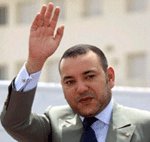
Morocco is celebrating today as the 50th anniversary of the return of late King Mohammed V from exile and the Declaration of Independence.
The son of Sultan Moulay Youssef, Sultan Mohammed Ben Youssef was born on August 10, 1909 in Fès. He ascended to the throne on November 18, 1927.
He proclaimed the North African country's independence from France and publicly cooperated with the nationalists, which gave birth to the Independence Manifesto on January 11, 1944.
His political sympathy with the nationalists disturbed the French authorities, notably when he paid a historic visit to Tangier on April 10, 1947. Here he delivered the famous Tangier Speech, that denounced the colonial policy.
Angered by the Sultan's political action, the French Resident General forced King Mohammed V into exile on Corsica on August 20, 1953, then to Madagascar on January 2, 1954.
In protest against the exile of their political and religious leader, Moroccans took to the streets in bloody riots throughout the Kingdom, calling for the immediate return of the Sultan.
In parallel to the political action conducted by the nationalists, the Liberation Army was created and launched several attacks against the colonizer's interests.
People were more than ever attached to their King. The nationalists' claim that the reflection of King Mohammed V's face could be seen in the moon spread throughout the Moroccan territory. This myth consolidated the legitimacy of the Sultan even in the farthest regions of the Kingdom. The Sultan became the epitome of Moroccan nationalism.
French authorities attempted to force the Sultan to leave office. They even threatened him: to either quit and go and live in France, or to be subject to harder exile conditions. Their efforts were in vain.
At the international level, the USA and Great Britain had started opposing the political decisions of General Juin from 1951 and their diplomats did not recognize the petition signed by some notables, which recognized Ben Arafa as their Sultan.
After August 21, 1953, representatives of 15 Arab-Asian states in the United Nations highlighted the fragility of the political stability in North Africa because of the exile of King Mohammed V.
Spain, for its part, supervised the signing of a petition by 430 notables in the regions it controlled, stressing that the Sultan's exile was the plot of the French Resident General.
Internal political vacuum resulted from the Moroccan people's refusal to recognize Ben Arafa as a Sultan, international sympathy with Sultan Mohammed V and popular support for him. This forced the colonial authorities to hold a meeting in the French region of Aix-Les-Bains, with Moroccan officials representing various political factions to discuss the return of Mohammed V. On September 5, 1955, King Mohammed V accepted the Aix-Les-Bains accord.
On November 16, 1955, Sultan Mohammed V returned home to mark the end of the colonial era and the dawn of independence.
M'Bark Bekka, under the instructions of Sultan Mohammed V, formed the first Moroccan government on November 16, 1955. The main aim of the new government was to pursue negotiations with France to get independence, which became a reality when the Independence Act was signed on March 2, 1956.
Mohammed V died on February 26, 1961 and his son, Hassan II succeeded him to the throne.

Tags: Morocco, Fès, travel, Fez,

No comments:
Post a Comment